Dear readers,
The words in the title of this post baffle me. When Jesus was hanging on the cross–such a gruesome, painful means of execution–he said these words, referring even to those mocking him and “casting lots” below his bleeding feet.
“When they came to the place called the Skull, they crucified him there, along with the criminals—one on his right, the other on his left. Jesus said, “Father, forgive them, for they do not know what they are doing.”And they divided up his clothes by casting lots.” Luke 23: 33-34
What did Jesus mean when he said that the very people who had orchestrated his death did not know what they were doing? They had been planning this a long time–how could they not have known?! I find that when I begin to ask questions about this , I can do it in faith, trying to understand and learn more about who Christ is (and then recognizing that I can never fully understand the mystery of God’s mercy). Or I can do it in arrogance, perhaps even thinking that I somehow know better than Jesus. Of course, the first way is the way forward–but it is the way that feels more supernatural than human, more a gift than a logically reasoned conclusion. It is the hardest way.
How (and why?!) should I show empathy to someone who fails to show empathy themself, who might even orchestrate and perpetuate cruelty?
Jesus tells us, in this instance and in Matthew 5:44, that Christ followers must “love your enemies, and pray for those who persecute you.”
This is the heart of the gospel and–for many of us–the hardest part. And this is one of the many reasons that MLK called Jesus “an extremist for love.”
We can never know why someone actually commits the evil (or what appears to be evil to us) that they do. They don’t even fully know it themselves. As Simone Weil writes, “All sins are attempts to fill voids.” We do not truly know ourselves, and we certainly do not know others. We are paradoxically called upon to be angry over injustice while still loving those who commit these injustices. This is the deep, atypical, supernatural mystery at the heart of the Christian gospel.
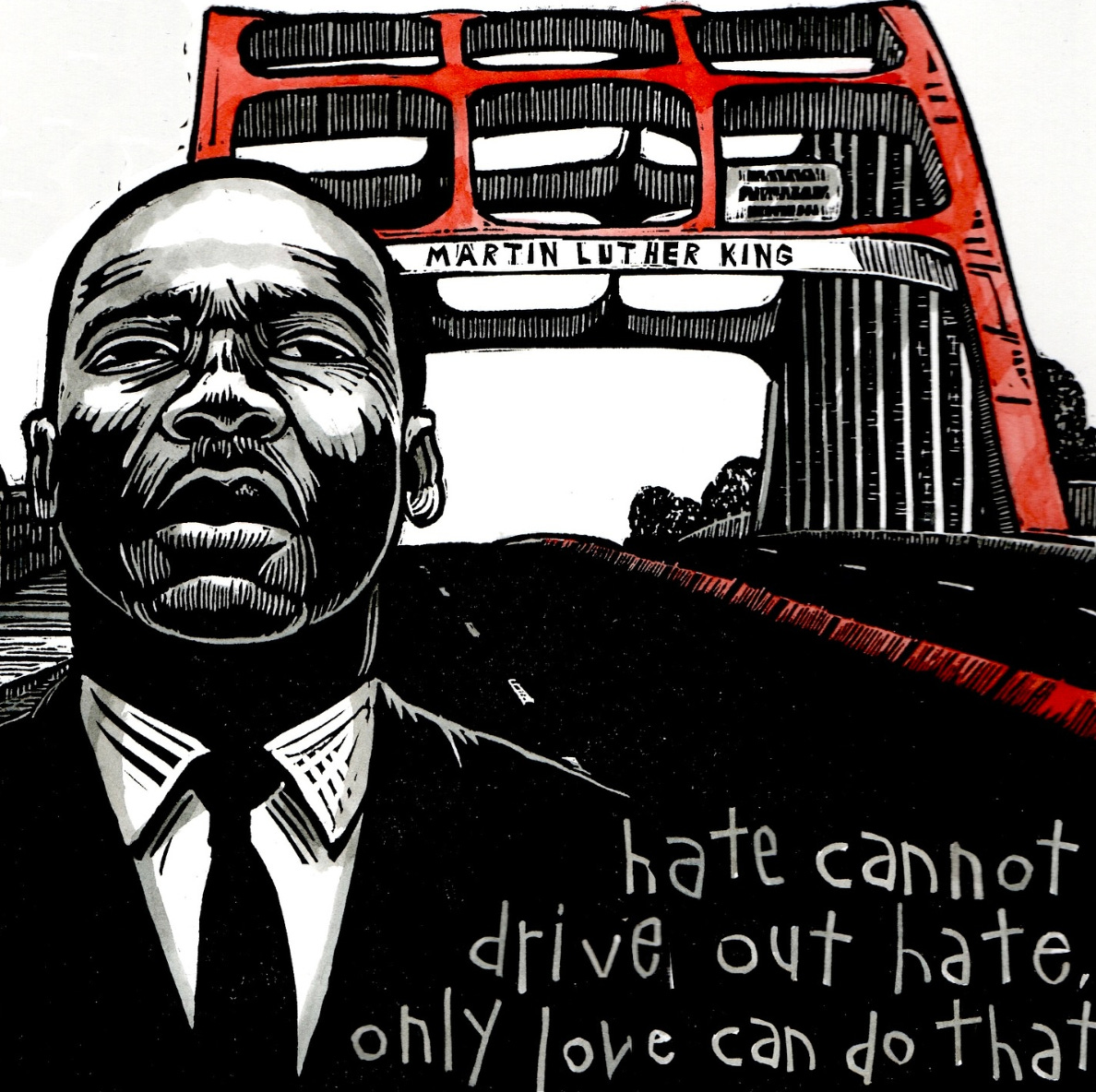
This has all been on my mind for many reasons, including my posting of the following quote that I found via Facebook. This is just a portion of a woman’s lament and cry for prayers. She writes:
“I voted for Trump
And it cost me immensely.
16 years ago, I met a boy. We were in high school. He became my first love, my first boyfriend and the father of my first child.
He was many things but at the top of the list was a superb father. That man would go to the ends of the earth to look for the last pencil if that’s what I told him our daughter needed.
He wasn’t JUST the father of my child. He became my bestest friend. He was my family.
His biggest fault?
He wasn’t legal.
Despite being here before he could even walk……..
Despite not having any criminal record……
Despite making multiple trips to DC (as an adult) to acquire the paperwork to be here the “right way”; papers his mother should have taken the responsibility to get for him when he was just a child…….
Despite hiring immigration lawyers……
The father of my oldest child is being extradited.
My oldest child is loosing her father because of Trumps immigration policies.”
Underneath the post, I saw this:
The vast majority of responses to this post (12 thousand, in fact) express laughter, mockery–a toxic “we told you so” emoji. At first, I thought that most of this laughter must have come from MAGA supporters who were happy to see this “illegal” driven out of the country (I have seen many, many laughter emojis from MAGA folks in response this sort of thing). Upon further inspection, I realized that many of these “laughter” responses were from the opposite side of the divide.
I was stopped in my tracks, once again reminded that both progressivism and MAGA-ism alone are manmade ideologies, lacking the heart of the gospel. I have seen a kind of vindictive, self-righteous (“I told you so, you stupid &$*@) fundamentalism on both ends of this spectrum.
Before I go on, I want to state that I not claiming that this woman who voted for Trump was my enemy. But my guess is that she was considered an enemy to the 12K who laughed at her painful post, finding some perverse joy in her suffering. I am also not saying that to have voted for Trump is a sin–although the votes that put him in office have led to what I see as a great deal of evil behavior and anti-life decisions from his administration. I have no idea why this woman–who I do not know–voted for Donald Trump. Maybe she was uninformed and too trusting. Maybe she was brainwashed. Maybe she was in denial. Or maybe she on board with his agenda wholeheartedly–until it harmed her family. The point is that–from where I am standing–this does not matter. At this moment, she is suffering the consequences of the choice that she and many others made. And this makes me sad for her and for her family–even though one might argue it was “her fault.”
For the sake of my argument, let’s assume that the 12K laughing readers consider the woman writing the post their enemy.
A woman voted for a politician who has caused much pain to many people, especially those considered “the least of these.” I agree that it is very frustrating to see that someone only understands the error of their ways when it affects them. It’s easy to feel a bit self-righteous over this and think, “I could never be that way.”
But isn’t this blindness descriptive of all of us?
Jesus tells us to love our enemies, even to pray for those who persecute us…
Have we ever been the enemy?
I have been critiquing, warning, screaming at the top of my lungs about the danger of Trumpism since 2015.
Does this make me superior to those who “don’t get it”?
If I am honest, I have some pretty dark urges in my heart, and I wonder where I would be if I had not heard the gospel at a young age (and had a mother whose life depended on it)?
I am not saying that there are not consequences to poor choices and sinful actions. I am not saying that we should not call out rotten fruit and speak truth to power.
What I am saying is that for someone to turn around from their distorted understanding of reality–at whatever stage–is a miracle. Their realization should be approached with humility and awareness of our own frail condition rather than vindictiveness and self-righteousness.
And we are also called to love those who might NEVER change. What does that even look like? The cross, of course.

In ruminating over this, I started to reflect upon a series of protests I was involved in during the summer of 2020 on the front lawn of the university for which I used to teach. Right in front of our campus–and in the middle of smalltown TN–there (still) is a Confederate monument left over from the Jim Crow era, both to honor the goals of the Confederacy and to remind Black citizens of their place. This still causes pain to many black residents and many students at the local university.
One such student, a young African American girl only 19 years old, started a petition to ask to have this monument moved to a museum (not destroyed). I don’t think she ever imagined the uproar that this would cause and the amount of venom that would be spewed by people twice her age as they insulted, belittled, and harassed her. She even received death threats.
This anger and hatred was unearthed in our town—the casual Southern “niceness” turned caustic–even dangerous–as we saw so much hate and anger toward anyone who sided with the Black residents of the town.
I was very angry, especially as I saw this hatred towards a Christian student whose responses—even to the hate—were so full of love and grace. There was some very toxic–even demonic–behavior on display. How could I love these enemies, these oppressors, these very cruel people who seemed to know very well what they were doing?!
I am not writing this because I have easy answers or perfected it. I am writing this because I am still learning and need help myself. And because Jesus taught us to do these things that go against so many of our natural inclination, and it is very easy to brush this hard truths and sobering commands aside, letting righteous anger fester into bitterness.

On the last night of the protests, the we kneeled in silence as a long procession of trucks known as the “Trump Train” drove by us–over and over and over. They screamed, made obscene gestures, “rolled coal” (gunned their trucks so exhaust came up in our faces). It brought tears to my eyes to see so much hate (including children yelling awful things at us). I am not exaggerating when I say that it felt dark, oppressive, evil. They were driving recklessly and even getting very close to the sidewalk (see the video below by April Ajoy).
The police did nothing.
This was one time in my life when the sense of spiritual warfare was palpable.All I could do in the moment was pray, and I believe many of my fellow protestors were praying. I found out later that a White Nationalist group organized the Trump Train, and this was a very tiny taste of the demonic underbelly of America’s white supremacist roots. I felt very strongly–and I still do–that we must name this evil, rebuke it, and repent for our complicity in it while praying for God to give us strength to speak the truth in love.
As frightening as this was for me, I know that it was very mild compared to what most Black Americans have faced throughout our country’s short, often brutal history.
When listening to podcast months ago, I reminded by Dr. Esau MacCauley that even when suffering so unjustly, enslaved Black American Christians retained a “Christian anthropology,” refusing to dehumanize even their “masters” as they believed that God’s image was also present in their oppressors. The quote from Sojourner Truth shared below is just one example of this powerful, faithful witness. We also see this concern for the soul of the racist oppressor in the words of Sojourner Truth, Frederick Douglass, MLK, even James Baldwin (who was not a Christian).
When I kneeled and prayed as the “Trump Train” roared past us, anger was not my dominant emotion. I mainly felt pity and sadness. When I saw the contorted, angry faces of the children, I wondered if their parents had been socialized the same way. Of course, my deepest sadness was for those who were victims of this racist treatment. But I also remembered, as Resmaa Menakem teaches us, that even the oppressors are traumatized. The real way forward is to remember the humanity of both the oppressed and the oppressors.
Even more pointedly, my pastor, Kevin Smith, once said, “God loves the oppressed AND the opressor”—and I find that I need to remind myself of this often.
But this is so hard, especiallly in cases where we express kindness and our “enemies” express hate. It is very easy to fall into a kneejerk eye for an eye reaction.
But this is not the way of the suffering Christ.
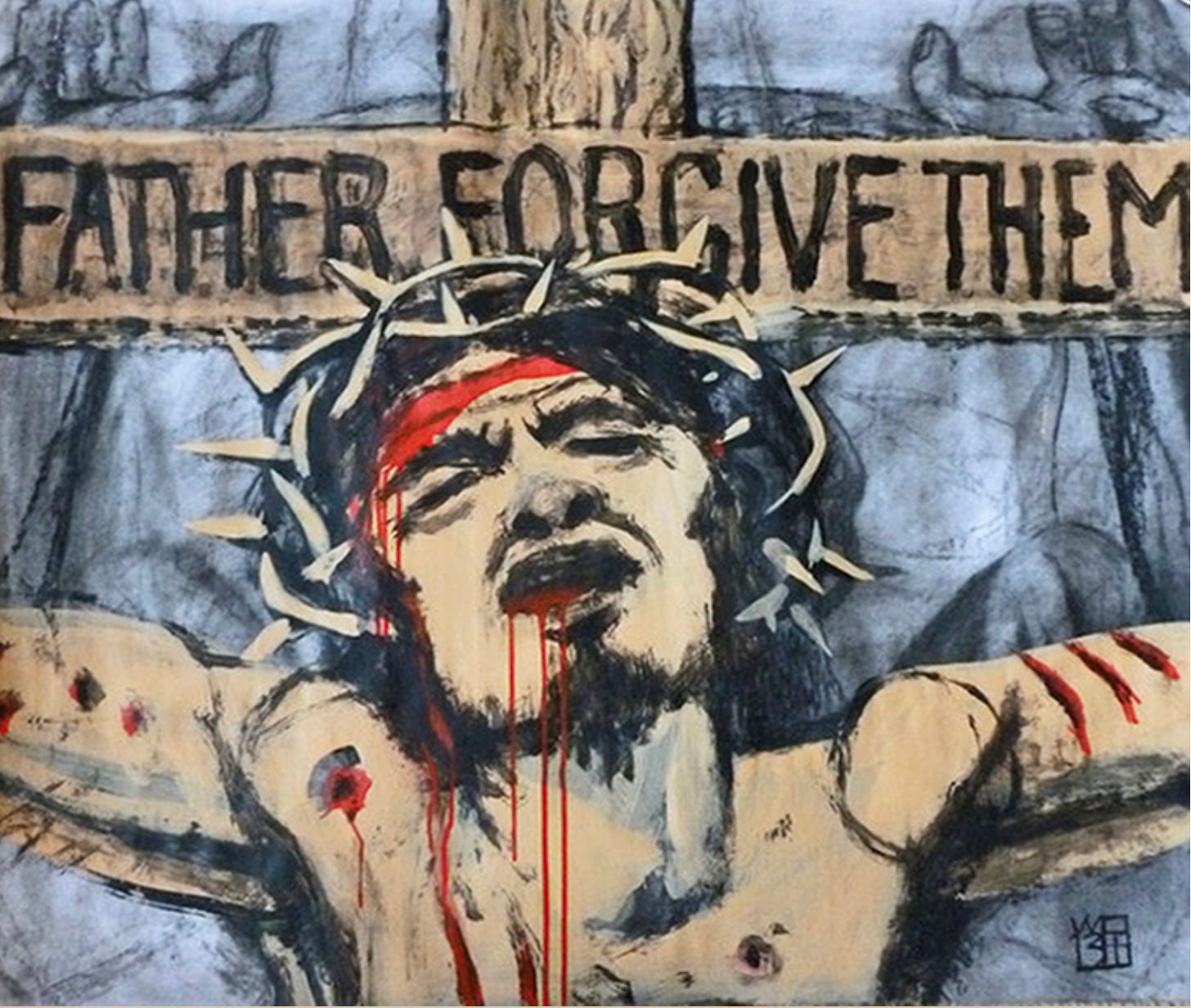
Of course, Christ’s entire life is our example for this. In fact, if we miss the idea of “loving our enemies” we miss out on a lot of the heart of the gospel.
We are told that while we were his enemies, Christ died for us. Not only did he pray for us and and show compassion for us, he laid down his life for his us. This is what enabled us to be transformed from enemy to friend.
This is hard. It is a truly supernatural calling. Our “natural” responses tend to be both revenge and self preservation in an almost Darwinian sense. According to Friedrich Nietzsche, Christ’s sacrifice is shameful because he did something so contrary to nature. In The Antichrist, he writes this of Jesus Christ:
“But this god of the "great majority," this democrat among gods, has not become a proud heathen god: on the contrary, he remains a Jew, he remains a god in a corner, a god of all the dark nooks and crevices, of all the noisesome quarters of the world!”
He means this as an insult—but I read it and say HALLELUJAH!
Christ’s humility is what enables us to be humble, his love for His enemies is what he also wants for us.
One of my favorite New Testament chapters is Matthew 23 when Jesus REBUKES the religious leaders, calling them “white washed tombs,” “hypocrites,” “brood of vipers.” He does NOT mince his words.
But the chapter ends like this:
37 “Jerusalem, Jerusalem, you who kill the prophets and stone those sent to you, how often I have longed to gather your children together, as a hen gathers her chicks under her wings, and you were not willing. 38 Look, your house is left to you desolate. 39 For I tell you, you will not see me again until you say, ‘Blessed is he who comes in the name of the Lord.’[c]”
New Testament scholar Jeff Dryden explains that both the rebuke and the tender picture of maternal care are acts of love as Christ is speaking the truth boldly in order to allow a chance for repentance. As we know from scripture (and maybe from life), the religious people who don’t know their spiritual sickness are often the ones who struggle the most to change.
I find myself most often getting the most angry at religious people. Aren’t we supposed to brothers and sisters in Christ? How can you say that? How can you do that? How can you threaten the life of one of my students while having a photo of a cross as your FB profile picture?
But Jesus’s example shows us that this is nothing new.
Every spring, I teach the autobiography of formerly enslaved abolitionist, Frederick Douglass. In the appendix to his autobiography, he quotes from Matthew 23 AT LENGTH when discussing the hypocrisy of slaveowners who used scripture out of context to brutalize, rape, and attempts to turn human beings into commodities. He makes a famous distinction between the “Christianity of this Land” and “The Christianity of Christ”.
And he IS ANGRY.
But his anger—at least on paper—never devolves into hatred of his enemy. Even his rebukes are full of mercy. He realizes that power corrupts and, at one point, he says that the institution of slavery is just as damaging for the slaveholder is it is for the slave.
The spiritual damage of the opressor’s heart is something to be pitied. And the oppressor could be any one of us when we get a taste of power.
The love, strength, and forgiveness that we see in the history of the African American Church—America’s true persecuted church—is an example of love for our enemies that HUMBLES me like no other HUMAN example.
Martin Luther King Jr. preached multiple sermons on the importance of loving our enemies. And once again, imagining his context is humbling. It was not unusual for him to find a burning cross in his yard, to receive death threats over the phone, to be beaten and unjustly jailed. I am sure it was very hard for him to love. But his words and his actions embodied this supernatural calling.
Like Douglass, he was able to humanize his oppressors and to care about the state of their souls. This is an important challenge to all of this. We need to work hard to SEE the IMAGE of GOD in the other person, even if they are cruel, hateful, seemingly unlovelable, If we see God’s Image, then we are reminded of three things: 1) We could be them ourselves yet Christ had mercy on us and 2) God loves them and 3) He can transform their hearts. And he might use us as part of the process.
MLK said that “hate distorts the personality of the hater.”
“And if you hate your enemies, you have no way to redeem and to transform your enemies. But if you love your enemies, you will discover that at the very root of love is the power of redemption.”
But once again, this is SO hard.
I have been encouraged recently by remembering that Jesus called Matthew, a tax collector, to follow him. Matthew had aligned himself with the oppressors and was benefitting from their power while harming his own people. He was a traitor.
But Jesus called him.
Jonah was an arrogant self--righteous racist—but the Lord called Him.
Saul was, to some degree, a religious terrorist. But Jesus called him.
It seems to me that if we miss THIS, this lavish grace and these miraculous transformations then we are not seeing from a Kingdom perspective.
And if the ugliness of our own hearts were unearthed, wouldn’t we, at least at times, find Pharisees, racists, even—according to Jesus’ teaching—murderers.
But thank God that he has chosen to love, and–in that love–TRANSFORM, his enemies.
I will leave you with a beautiful segment of one of MLK’s sermons on loving enemies:
“It’s significant that Jesus does not say, “Like your enemy.” Like is a sentimental something, an affectionate something. There are a lot of people that I find it difficult to like. I don’t like what they do to me. I don’t like what they say about me and other people. I don’t like their attitudes. I don’t like some of the things they’re doing. I don’t like them. But Jesus says love them. And love is greater than like. Love is understanding, redemptive goodwill for all human beings, so that you love everybody, because God loves them. You refuse to do anything that will defeat an individual, because you have agape in your soul.”
Lord, please help us to have AGAPE in our souls. In the name of Jesus, Amen.
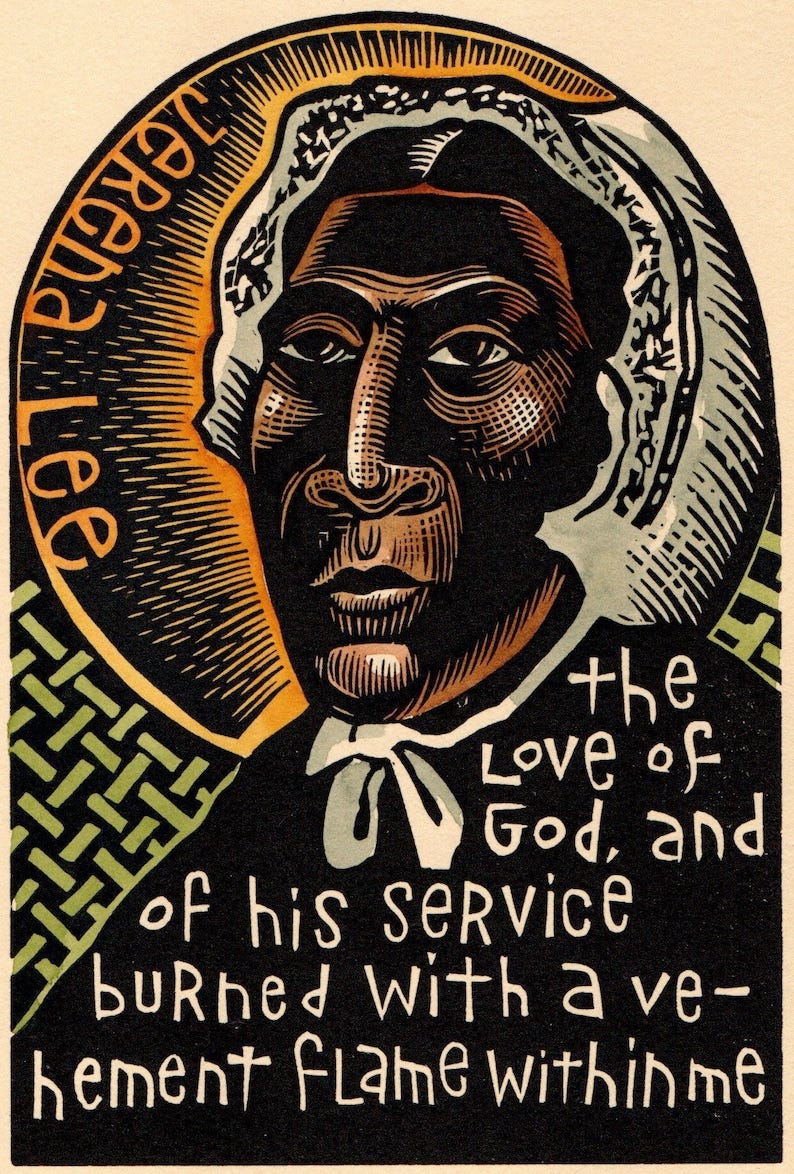





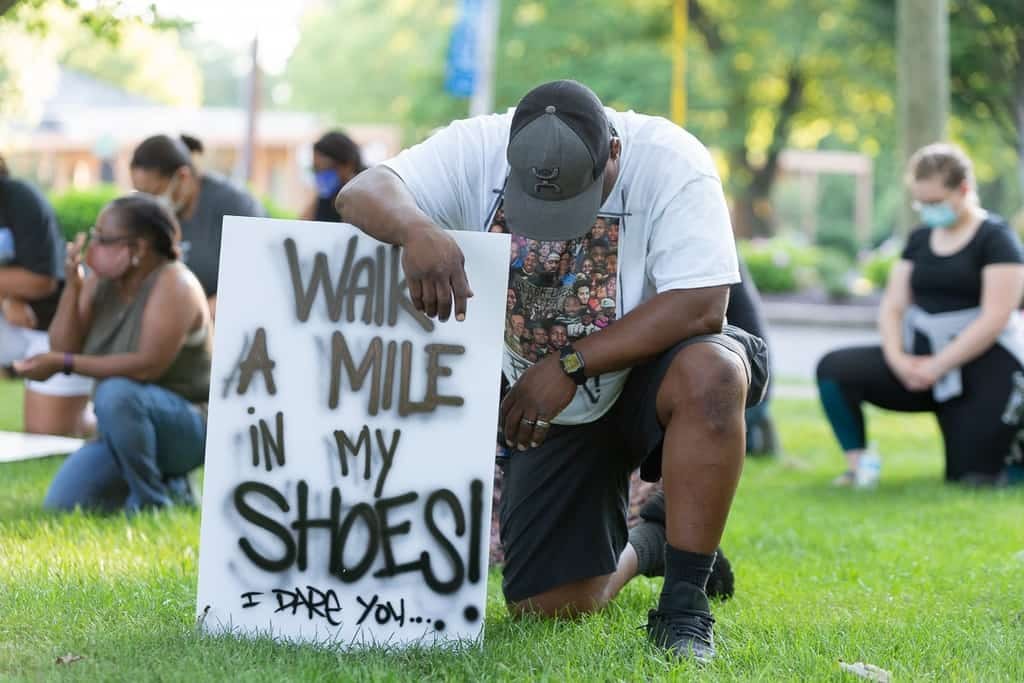




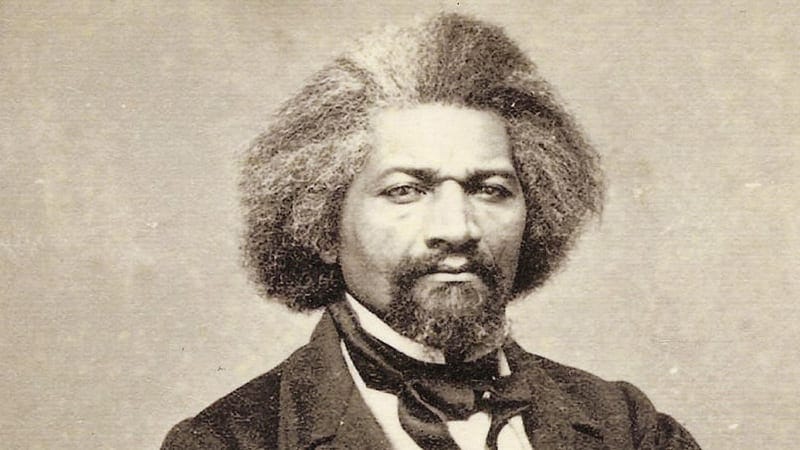
![Martin Luther King, Jr., pulls up cross that was burned on lawn of his home, as his son stands next to him, Atlanta, Georgia] | Library of Congress Martin Luther King, Jr., pulls up cross that was burned on lawn of his home, as his son stands next to him, Atlanta, Georgia] | Library of Congress](https://substackcdn.com/image/fetch/$s_!h14D!,w_1456,c_limit,f_auto,q_auto:good,fl_progressive:steep/https%3A%2F%2Fsubstack-post-media.s3.amazonaws.com%2Fpublic%2Fimages%2Fb6bdcbdf-3673-4dea-b2c8-cc40f10567e7_640x517.jpeg)